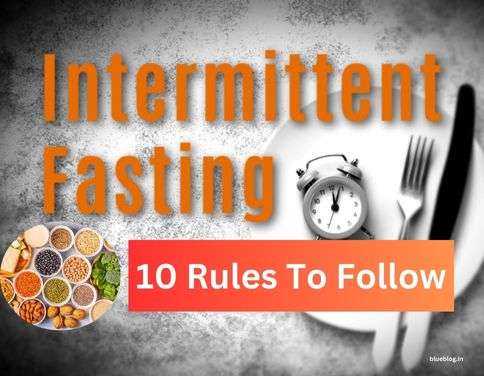Intermittent fasting has emerged as a popular trend for weight loss and overall health improvement. It involves cycling between periods of eating and fasting, with various methods to choose from. While intermittent fasting can offer numerous benefits, avoiding common mistakes is essential to maximize its effectiveness and safety.
Understanding Intermittent Fasting:

Intermittent fasting has gained immense popularity in recent years as a method for weight loss, improved health, and increased longevity. This eating pattern involves cycling between periods of eating and fasting, with various methods to suit individual preferences and lifestyles. While intermittent fasting can offer numerous benefits, there are common mistakes that many people make that can hinder progress and even cause harm to health. Let’s explore the ten mistakes to avoid while practicing intermittent fasting, ensuring you make the most out of this dietary approach.
1. Not Staying Hydrated

Hydration is crucial, especially during fasting periods. Many people make the mistake of neglecting their fluid intake, which can lead to dehydration and unpleasant side effects such as headaches, fatigue, and dizziness. Remember to drink plenty of water throughout the day, even when fasting. Herbal teas, black coffee, and sparkling water can also help keep you hydrated without breaking your fast.
2. Skipping Breakfast and Overeating Later

Skipping breakfast might seem like a convenient way to extend your fasting window, but it can backfire later in the day. Research suggests that skipping breakfast may lead to overeating during subsequent meals, which can sabotage your weight loss goals. Instead of skipping breakfast altogether, opt for a balanced meal that includes protein, healthy fats, and fiber to keep you full and satisfied until your next meal.
3. Ignoring Nutrient-Rich Foods

One common mistake people make while intermittent fasting is focusing solely on calorie restriction without considering the quality of their food choices. It’s essential to prioritize nutrient-rich foods such as fruits, vegetables, lean proteins, and whole grains to ensure you’re getting all the essential vitamins and minerals your body needs to thrive. Incorporating a variety of colorful foods into your meals can help you meet your nutritional requirements and support overall health.
4. Relying Solely on Junk Food

While intermittent fasting allows for some flexibility in food choices, relying solely on junk food during eating windows is a mistake that can negatively impact your health. Processed snacks, sugary treats, and fast food may provide temporary satisfaction, but they lack the essential nutrients your body needs to function optimally. Instead, focus on nourishing your body with whole, minimally processed foods that provide sustained energy and promote overall well-being.
5. Overdoing the Feasting Period

During eating windows, it’s easy to fall into the trap of overeating, especially if you’ve been fasting for an extended period. Overeating can negate the benefits of intermittent fasting and may lead to weight gain over time. Practice mindful eating by paying attention to your hunger and fullness cues, and aim to eat until you’re satisfied, not stuffed. Portion control is key to maintaining a healthy balance during feasting periods.
6. Not Listening to Your Body

Listening to your body’s signals is essential when practicing intermittent fasting. Ignoring hunger cues or pushing yourself too hard can lead to feelings of deprivation and burnout. It’s essential to find a fasting schedule that works for you and adjust it according to your body’s needs. If you’re feeling excessively hungry or fatigued, consider shortening your fasting window or experimenting with different fasting methods until you find what works best for you.
7. Over-Exercising While Fasting

Exercise is an essential component of a healthy lifestyle, but overdoing it while fasting can be counterproductive. Intense workouts can increase cortisol levels and may leave you feeling depleted, especially if you’re not adequately fueled. Instead of high-intensity exercise during fasting periods, opt for gentle activities such as walking, yoga, or light resistance training. Save more intense workouts for times when you’re in a fed state to ensure you have the energy and stamina to perform at your best.
8. Expecting Immediate Results

It’s natural to want to see immediate results when starting a new diet or lifestyle change, but it’s essential to be patient and realistic with your expectations. Intermittent fasting is not a quick fix or a one-size-fits-all solution. Results may vary depending on factors such as age, gender, metabolism, and overall health. Instead of focusing solely on the scale, pay attention to how you feel, your energy levels, and any improvements in your overall health and well-being.
9. Neglecting Sleep

Sleep is often overlooked but plays a crucial role in overall health and weight management. Neglecting sleep can disrupt hormone levels, increase appetite, and make it harder to stick to your fasting schedule. Aim for seven to nine hours of quality sleep each night, and establish a relaxing bedtime routine to help you unwind and prepare for restorative sleep. Prioritizing sleep will not only support your intermittent fasting efforts but also improve your overall health and vitality.
10. Not Consulting a Healthcare Professional

Before embarking on any new diet or fasting regimen, it’s essential to consult with a healthcare professional, especially if you have underlying health conditions or are taking medications. A qualified healthcare provider can offer personalized guidance and ensure that intermittent fasting is safe and appropriate for you. They can also help monitor your progress and make any necessary adjustments to your fasting protocol to optimize results and minimize any potential risks.
Follow Us On Instagram Follow Us On XAlso read: How much weight can I lose in 10 days with intermittent fasting


[…] Also read: 10 mistakes to avoid while doing intermittent fasting […]
[…] Also read:10 mistakes to avoid while doing intermittent fasting […]